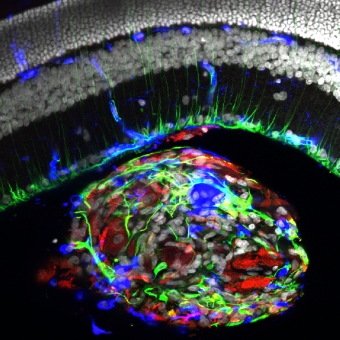Stem Cell Agency Funded Therapy for Blinding Disease Treats First Patients
Retinitis pigmentosa (RP) is a progressive inherited disease of the eye, in which the light-sensitive photoreceptor cells located in the retina degenerate. This results first in the loss of night and peripheral vision, eventually progressing to the loss of central vision and total blindness. It is the leading cause of inherited blindness in the developed world.
The disease, which affects approximately 1.5 million people in the world, has no cure, but thanks to a clinical trial that was based in part on research done at UC Santa Barbara, a new stem cell therapy may soon be available that protects photoreceptor cells from the damaging effects of the mutation. So far, four legally blind patients with RP have begun the trial.
“Currently, there’s no cure and no effective treatment for this disease, so this trial represents the first attempt using stem cells to prevent the loss of vision that would otherwise occur in these patients,” said UCSB Neuroscience Research Institute lead scientist Geoffrey Lewis.
Funded by the California Institute of Regenerative Medicine, the experimental therapy consists of a single injection of retinal progenitor cells — a type of stem cell — into the eye. The research was led by Henry Klassen, M.D., of UC Irvine School of Medicine’s Gavin Herbert Eye Institute.
“The progenitor cells are known to secrete specific growth factors,” said Lewis. The hope is that the growth factors secreted from the progenitor cells will protect the affected photoreceptors and prevent them from dying, thus preserving the patient’s remaining vision, he explained.
At UCSB, Lewis, along with Steven Fisher, research professor in the Neuroscience Research Institute, worked closely with the UCI research group and performed much of the FDA-required pre-clinical work that demonstrated the safety and efficacy of the procedure.
As to the four patients who have undergone the treatment, researchers plan to monitor them for at least a year to see if the injected progenitor cells do indeed work to preserve their vision. Without any treatment, the patients would inevitably go blind, said Lewis.
Contact Info:
Sonia Fernandez
(805) 893-4765
sonia.fernandez@ucsb.edu

